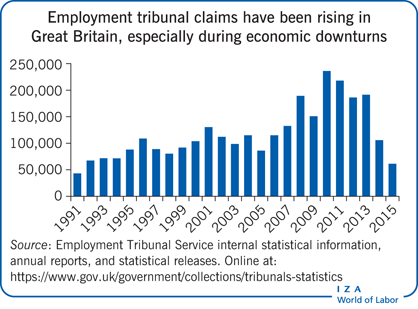Elevator pitch
Employment tribunals or labor courts are responsible for enforcing employment protection legislation and adjudicating rights-based disputes between employers and employees. Claim numbers are high and, in Great Britain, have been rising, affecting both administrative costs and economic competitiveness. Reforms have attempted to reduce the number of claims and to improve the speed and efficiency of dealing with them. Balancing employee protection against cost-effectiveness remains difficult, however. Gathering evidence on tribunals, including on claim instigation, resolution, decision making, and post-tribunal outcomes can inform policy efforts.

Key findings
Pros
Employment tribunals and other labor courts are important institutions for enforcing workers’ legal rights and protections.
The incidence of claims—notably for unfair dismissal—rises during economic downturns and varies with other factors, including the extent of unionization.
Settling cases before hearings are held depends on parties’ expectations about what the adjudicated decision will be and on conciliation interventions.
Tribunal judgments reflect social and economic factors as well as legal and procedural compliance.
Cons
High numbers of claims place pressure on the tribunal system and can result in significant costs to both sides in the case and to the state.
Because tribunals are charged with enforcing employment protection legislation, they have been criticized for having a negative impact on labor markets.
For a small number of claimants, most notably those whose cases are dismissed without a hearing, there appear to be adverse labor market consequences from seeking redress through tribunals.